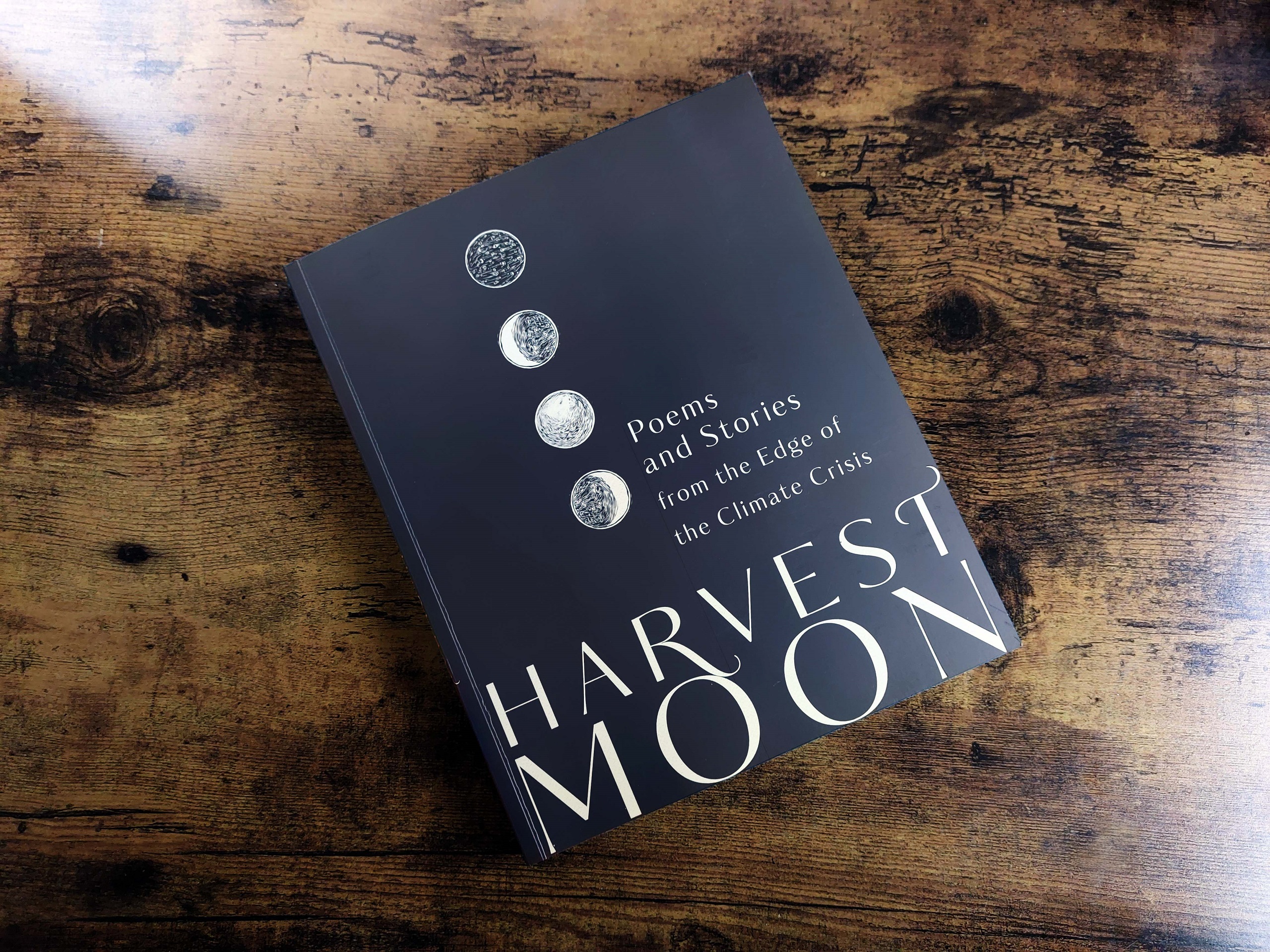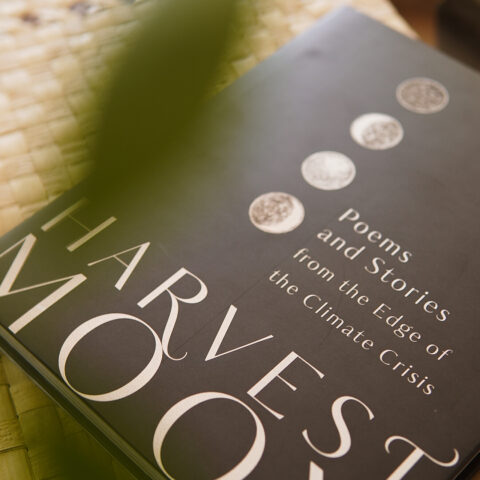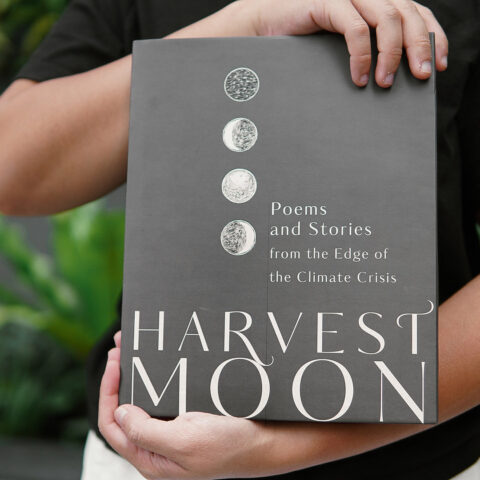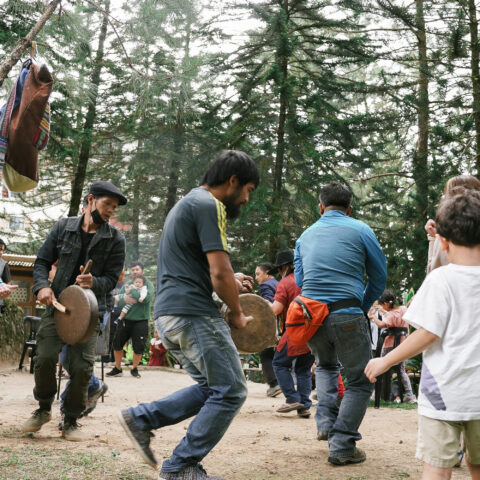Harvest Moon: Poems and Stories from the Edge of the Climate Crisis, the 2021 limited Philippine edition, published by Institute for Climate and Sustainable Cities and Milflores Publishing. Photo taken by © Joseph Manalo/The Agam Agenda.
By Pilar Zita Medina
Harvest Moon: Poems and Stories from the Edge of the Climate Crisis made me reflect on how I, as an individual member of society, have contributed to climate activism. At the time I read the book, I’d been struggling with a personal dilemma. I had spent the last couple of years making efforts to spark climate conversation at my school, but I never felt like I was able to make waves with those efforts. I’d done talks, creative projects, and at some point even vegan bake sales with friends to raise money for the cause. I really tried to do all that I could with the skills and resources I had at the time, with varying degrees of execution. Harvest Moon helped me begin to recollect those thoughts, and it made me think about how I had previously been approaching the thoroughly complex issue of climate change.
While it has taken me a long time to do it: collecting my thoughts on the book and turning them into a cohesive conclusion on what I truly feel about Harvest Moon, I think the book taught me a lot of valuable things about being a storyteller and a communicator. More importantly, the book taught me about how someone’s creativity and their story can make a huge difference.
The possibility to change how young adults think of climate change and activism
When Padma (Padmapani Perez) first told me about the project, coming off the heels of the previous book, Agam: Filipino Narratives on Uncertainty and Climate Change (published in 2014), I honestly didn’t think much about the concept of “talking about climate change without mentioning the term climate change”, and I mostly just saw it as a creative challenge for writers. What I didn’t realize at the time was that this challenge was one of the most important decisions someone could’ve made when talking about climate change—because it has the possibility of changing the landscape of the general conversation about the issue.
Harvest Moon changed my perception of [climate change] entirely. And in so many ways, it made me want to do better as a person.
I’m not overstating the significance of the project because Padma and I are friends, just to be clear. I mean it wholeheartedly when I say that this book and the scope it introduced with its international variety of authors, has the possibility of changing the way that readers with no previous engagement with climate activism perceive the issue. And more importantly, it has the possibility of changing the way that younger people like me: students, and young adults, look at climate activism and climate change as an issue.
Because the book did just that for me: it changed my perception of the issue entirely. And in so many ways, it made me want to do better as a person. I’m getting ahead of myself when I say that this book has made me feel strong things without explaining how it does that specifically, so I’ll start explaining how the book made me feel the need to change.
I’ll start off this explanation by saying that I, and a lot of other people at the ripe old age of 12-17, don’t really appreciate being told outright that we are obligated to do something. This is especially true when we’re asked to work on something we are not emotionally invested in. We end up not putting in our all. Most of the time, it can be small and mundane things, like finishing the essay you’ve neglected to work on for 2 weeks or housework that feels pretty gross to do, like cleaning the bathroom floor. I suppose that’s why people like us feel like we get on other people’s nerves.
I used to feel that this was a small and contemporary issue, but I slowly started to realize while reading this book that this is a fundamental flaw of ours when it comes to our involvement with global issues. People are told over and over again, from Kindergarten to Grade 12, that they need to be active in their communities and involved with different groups to tackle issues like climate change, and yet, they’re always left with the lingering question of: “Why should I?”
Making connections through the stories and experiences in Harvest Moon
When it comes to climate change, that question can always be answered in the classroom using the scientific perspective: “The issue is a threat to many ecosystems across the globe, and the change in climate makes the weather violent and relentless, to put it simply.” Students have been told that in their science classes for years, and that’s the extent of which the issue has been touched upon in their classroom environment. So while they had their question answered, they still haven’t found the answer to the emotional side of their inquiry: “Why should I care?” Some students will start to feel emotionally compelled to act knowing the ecological and meteorological effect of climate change, but others need to be shown, in a unique way, how the issue goes far beyond the effects mentioned in their science classes.

The reason why Harvest Moon has the ability to change the reader’s perception of climate change, is because Harvest Moon completely shifts the focus of climate conversation from discussing the broad and scientific effects of the issue, to addressing the effects of the issue on humanity through different stories and poems from people around the world. And that is the important thing that gets emotionally-driven people, including teens, to start paying more attention, and to start feeling motivated to do something they truthfully are obligated to do: act on the issue with what they have.
The stories and the poems in the book, whether directly or indirectly, ask their readers to reflect on how they live, where they live and on what they plan to do moving forward after reading their narratives. This is why I anticipate that some teens might have difficulty with sitting with the book for long periods of time, as the book really did leave me with a lot of instances where I had to take a step back to think about those things.
Students need to be shown how climate change goes far beyond the effects mentioned in their science classes.
One specific moment I remember while reading the original manuscript was when I got to read a story called “Because your body is a border” by Rain Chudori. I started to think about one specific line I read: “There is a world untouched by everything that has happened here—”, that line came after how the author, Rain, described their home country when it was devastated by a massive drought. That line made me think about my own home country, where the rain can go on for weeks and weeks, and how it compares to theirs, where “rain has forgotten to come”. Two polar opposite effects and issues brought about by climate change. This is also contextualized by earlier poems in the book like “Llueve” (“Rain falls”) by Jose Zuleta and “La’Dxi Bidxi” (“Desert”) by Irma Pineda, that discuss the same issues and how they occur in other countries. The anthology’s themes of loss and seeking hope unify the writers and their stories, and the book allows the readers themselves to find small connections like the ones I found when reading the poems I mentioned above. And finding those connections was one of the most important things the book has done for me as a young reader.
The book never tells it to the readers straight. When I read the poems, I didn’t feel intimidated by who the authors were and I didn’t feel despair because of the subject matter. The book reimagines the climate conversation and it feels like I’m having a conversation with the authors about the climate.
That’s a powerful trait of Harvest Moon. And I hope other readers, young or old, will see the same connections that I did, and feel moved to carry the conversation on with others.




